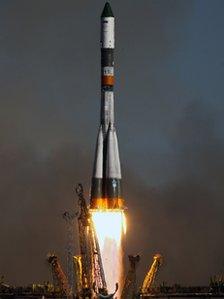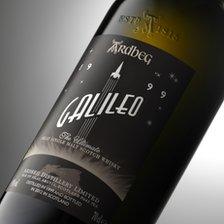Whisky space experiment tribute launched
- Published

The vials were launched by Soyuz rocket from Kazakhstan in late 2011
A limited edition whisky has been launched to mark a unique experiment in space.
A rocket carrying vials of chemical compounds from Ardbeg's Islay distillery was blasted up to the International Space Station last year to test the effects of near zero gravity on the maturation process.
Ardbeg has now released "Ardbeg Galileo" to celebrate the event.
The experiment is believed to be the first of its kind.
The micro-organic compounds will spend up to two years in space interacting with charred oak in near zero gravity conditions.
The results will be compared with a control sample currently maturing on terra firma at Ardbeg's Islay distillery.
Dr Bill Lumsden, director of distilling and whisky creation at Ardbeg, said: "So far so good. The experiment went live in January when the scientists broke the separating wall between the two components.
'Earthly tribute'
"We will not know the results for another year or so but in the meantime we thought we would celebrate the experiment by the introduction of Ardbeg Galileo - our own earthly tribute to the scientific experiment taking place far up in space."

Ardbeg said the limited edition whisky was "an earthly tribute"
The limited edition 12-year-old single malt whisky is a vatting of different styles of Ardbeg laid down in 1999.
Ardbeg was invited in late 2011 by Texas-based space research company NanoRacks to take part in the two-year space experiment.
The vials that were launched by Soyuz rocket from Baikanur in Kazakhstan in late 2011 contain a class of chemical compounds known as "terpenes".
Ardbeg said the experiment could explain the workings of these large, complex molecules and help uncover new information about the change they undergo in a near zero gravity environment.
The test should also help Ardbeg find new chemical building blocks in their own flavour spectrum and could have applications for a variety of commercial and research products.